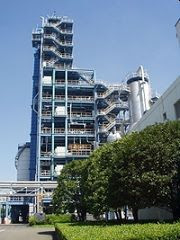Showa Denko Obtain License To Process Industrial Waste, Aiming To Promote Plastic Chemical Recycling
TOKYO, Aug 31, 2020 - (JCN Newswire) - Showa Denko (SDK; TSE:4004) obtained a license to process industrial waste, and started to accept used plastics which were crushed and molded.

Since 2003, SDK's Kawasaki Plant, which is located in Kawasaki City, Kanagawa Prefecture, has been operating "plastic chemical recycling business," a business to recycle used plastics as raw materials for chemicals under the provisions of Containers and Packaging Recycling Law. SDK calls this business "Kawasaki Plastic Recycling (KPR)." We gasify used plastics under high temperature, and decompose them to the level of molecules. Then gasified plastics are converted into hydrogen (low-carbon hydrogen) and carbon dioxide (CO2). We use low-carbon hydrogen as raw material to produce ammonia, and CO2 as raw material to produce dry ice and carbonated drinks.
SDK is the only company in the world that has track record of long-term commercial operation of plastic chemical recycling through gasification. These days, social needs for high-technology based recycling of used plastics as a countermeasure against plastic-debris problems including marine plastic problem have been increasing. SDK obtained the license to process industrial waste as a response to the increase in such social needs. In addition, this license enables SDK to diversify sources of used plastics. Thus, SDK has established a used-plastics procurement system that supports stable operation of KPR.
Among 9 million tons of used plastics discharged in Japan every year, 7.5 million tons are reused (390,000 tons are reused through chemical recycling, 2,080,000 tons are reused through material recycling, and 5,030,000 tons are reused through thermal recycling), and 1.42 million tons are not reused but incinerated or landfilled(1). Chemical recycling of plastics converts used plastics into raw materials and enables society to reuse them. Therefore, chemical recycling of used plastics attracts people's attention as one of key technologies that help people realize recycling oriented society.
Kawasaki City is recognized as Eco-town(2) by the Ministry of Economy, Trade and Industry. In July 2015, SDK and Kawasaki City concluded an agreement to cooperatively promote realization of society where low-carbon hydrogen with low environmental burden is utilized. SDK has been conducting demonstration experiments in which SDK supplies low-carbon hydrogen to fuel cells installed in a hotel located in Kawasaki City and a hydrogen station for fuel-cell vehicles. SDK conducts these demonstration experiments as "Demonstration Projects to Promote Local Consumption of Locally Produced Low-carbon Hydrogen Gas Made from Used Plastics" which has been commissioned by the Ministry of Environment.
SDK has been promoting businesses that support resources-recycling oriented society, aiming to contribute to solution of issues related to SDGs. Through provision of various products and services, we will continue contributing to creation of society where affluence and sustainability are harmonized.
[Notes]
(1) Estimated by Plastic Waste Management Institute
(2) "Eco-town Project" is a framework created by the Ministry of Economy, Trade and Industry. This Project aims to promote establishment of advanced environment-friendly community by ranking "Zero Emission Plan" as a basic plan to formulate environment-friendly economy and society and promoting it as the basis of reginal development.
About Showa Denko K.K.
Showa Denko K.K. (SDK; TSE:4004, ADR:SHWDY) is a major manufacturer of chemical products serving from heavy industry to computers and electronics. The Petrochemicals Sector provides cracker products such as ethylene and propylene, the Chemicals Sector provides industrial, high-performance and high-purity gases and chemicals for semicon and other industries, the Inorganics Sector provides ceramic products, such as alumina, abrasives, refractory/graphite electrodes and fine carbon products. The Aluminum Sector provides aluminum materials and high-value-added fabricated aluminum, the Electronics Sector provides HD media, compound semiconductors such as ultra high bright LEDs, and rare earth magnetic alloys, and the Advanced Battery Materials Department (ABM) provides lithium-ion battery components. For more information, please visit www.sdk.co.jp/english/.


 Global Strategic Communications Council: One Year After Signing The Tripling Pledge, Governments’ Targets Are Unchanged, Even As Solar’s Prospects Are Upgraded
Global Strategic Communications Council: One Year After Signing The Tripling Pledge, Governments’ Targets Are Unchanged, Even As Solar’s Prospects Are Upgraded UN Climate Change: Financing The Future - Vera Songwe’s Vision For A Climate And Growth Agenda At COP29
UN Climate Change: Financing The Future - Vera Songwe’s Vision For A Climate And Growth Agenda At COP29 Glasgow Actions: At COP29, Global Activists Urge Strong Climate Finance Deal By Transforming Baku's Olympic Stadium Into Call For Action
Glasgow Actions: At COP29, Global Activists Urge Strong Climate Finance Deal By Transforming Baku's Olympic Stadium Into Call For Action Climate Action Network: COP29 - Repression Epidemic Regarding Climate Activists And Human Rights Defenders
Climate Action Network: COP29 - Repression Epidemic Regarding Climate Activists And Human Rights Defenders Demand Climate Justice DCJ: Climate Justice Groups Condemn COP29’s Carbon Markets Decision - Corporate Profits vs People’s Interests
Demand Climate Justice DCJ: Climate Justice Groups Condemn COP29’s Carbon Markets Decision - Corporate Profits vs People’s Interests UN News: COP29 - Push For Agreement On A New Climate Finance Deal ‘Right From The Start’
UN News: COP29 - Push For Agreement On A New Climate Finance Deal ‘Right From The Start’